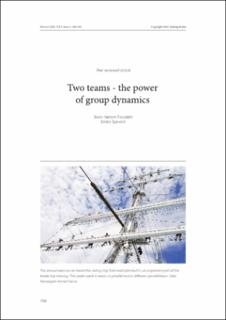Two teams - the power of group dynamics
Peer reviewed, Journal article
Permanent lenke
https://hdl.handle.net/11250/2683225Utgivelsesdato
2020Metadata
Vis full innførselSamlinger
- Artikler [251]
Sammendrag
This paper reports findings from a pilot study regarding the marked differences in academic and extracurricular performance in two teams at the Royal Norwegian Naval Academy. The findings suggest that intelligence (IQ) or General Mental Abilities (GA) do have a say, but the significant differences between the two teams are related to teamwork and cooperation. The data suggest that main drivers for performance are task orientation, caring, engagement and empathy, which was evident in the team with the highest performance. These behavioral markers support other research (Google, 2014; A. Pentland, 2015; Torgersen, 2018) regarding team behavior that boosts team performance. On the other hand, behavior as passivity, selfsufficiency, opposing and spontaneous behaviors was found in the low performance group. The key takeaway is that teams may perform very well if members use fruitful behavior as stated above. This is possible to achieve for most people regardless of their GA. The behavior markers described in this article are perhaps more precise and helpful as trainable skills, skills that require effort on the team’s part to hone and get better at. The data also suggest that proper teamwork can equalize GA differences in teams when it comes to performance.
